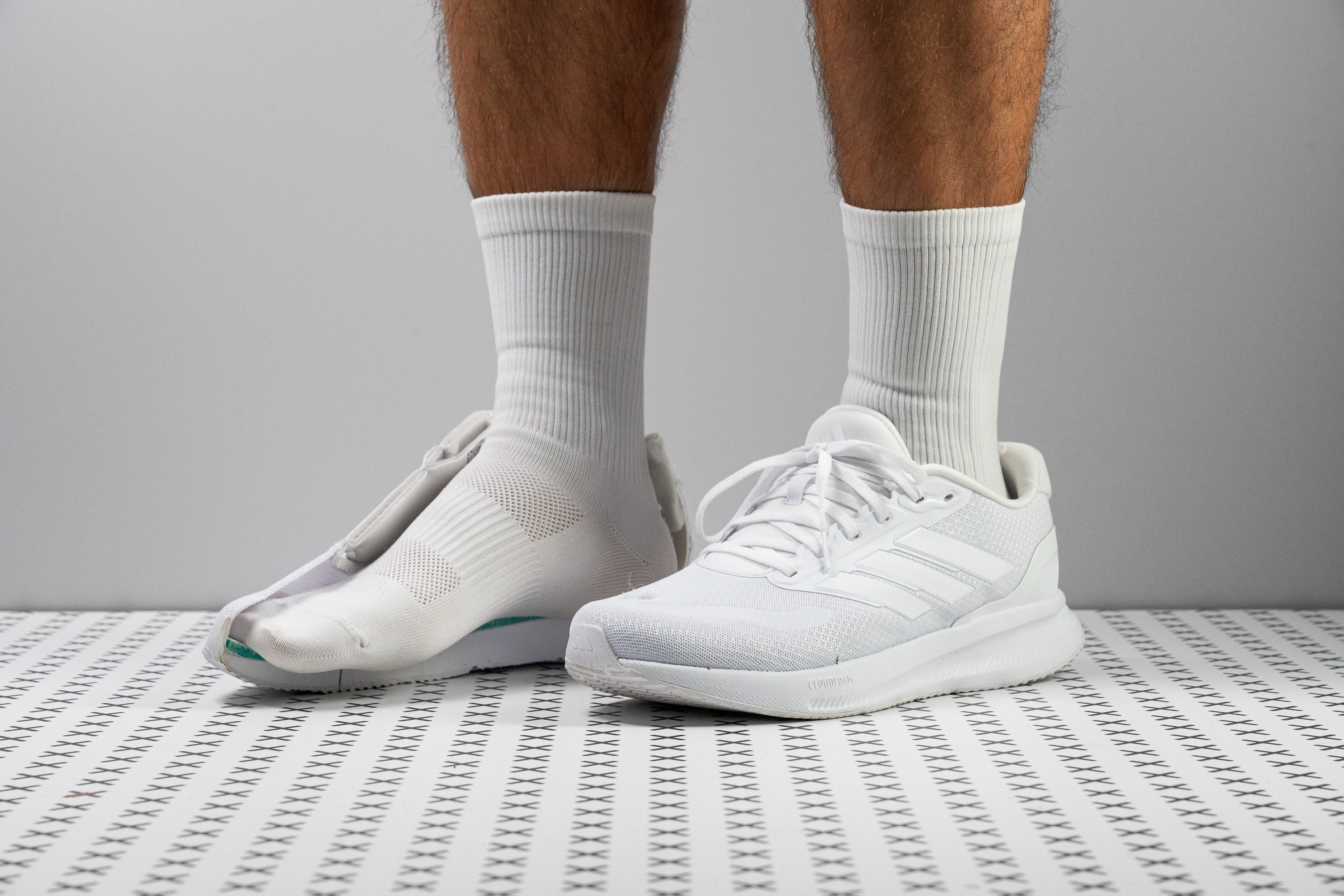Our verdict
Pros
- Exceptionally affordable
- Comfortable for walking
- Ideal for heel strikers
- Performs well in cold climates
- Cushy upper material
- Ultraboost-inspired heel design
- Ortholite insole
- Improved heel design
Cons
- Shockingly poor durability
- Insufficient forefoot cushioning
- Firm midsole
- Awful traction
Audience verdict
- Top 30% most popular running shoes
Comparison
The most similar running shoes compared
+ + Add a shoe | |||||
|---|---|---|---|---|---|
| Audience score | 85 Good! | 77 Decent! | 80 Good! | 79 Good! | |
| Price | $65 | $75 | $90 | $70 | |
| Pace | Daily running | Daily running | Daily running | Daily running | |
| Shock absorption | Moderate | Moderate | Low | Moderate | |
| Energy return | Low | Low | Low | Low | |
| Traction | Low | Moderate | Moderate | Moderate | |
| Arch support | Neutral | Neutral | Neutral | Neutral | |
| Weight lab Weight brand | 9.7 oz / 275g 10.7 oz / 303g | 9.3 oz / 265g 9.4 oz / 267g | 10.5 oz / 298g 10.8 oz / 305g | 9.7 oz / 275g 9.7 oz / 275g | |
| Drop lab Drop brand | 9.4 mm 10.0 mm | 10.1 mm 10.0 mm | 8.6 mm 10.0 mm | 7.8 mm 8.0 mm | |
| Strike pattern | HeelMid/forefoot | Heel | HeelMid/forefoot | Mid/forefoot | |
| Size | True to size | Slightly small | True to size | True to size | |
| Midsole softness | Balanced | Balanced | Balanced | Balanced | |
| Difference in midsole softness in cold | Small | Small | Big | Small | |
| Toebox durability | Bad | Decent | Decent | Bad | |
| Heel padding durability | Bad | Good | Decent | Good | |
| Outsole durability | Decent | Good | Decent | Decent | |
| Breathability | Moderate | Moderate | Moderate | Moderate | |
| Width / fit | Wide | Medium | Medium | Medium | |
| Toebox width | Medium | Medium | Narrow | Medium | |
| Stiffness | Moderate | Moderate | Moderate | Moderate | |
| Torsional rigidity | Flexible | Moderate | Stiff | Moderate | |
| Heel counter stiffness | Moderate | Moderate | Stiff | Stiff | |
| Heel lab Heel brand | 31.2 mm 33.0 mm | 32.2 mm 32.0 mm | 33.0 mm 34.0 mm | 31.2 mm 31.0 mm | |
| Forefoot lab Forefoot brand | 21.8 mm 23.0 mm | 22.1 mm 22.0 mm | 24.4 mm 24.0 mm | 23.4 mm 23.0 mm | |
| Widths available | NormalWide | NarrowNormalWideX-Wide | Normal | NormalWideX-Wide | |
| Orthotic friendly | ✓ | ✓ | ✓ | ✓ | |
| Season | All seasons | All seasons | All seasons | All seasons | |
| Removable insole | ✓ | ✓ | ✓ | ✓ | |
| Ranking | #206 Bottom 46% | #352 Bottom 8% | #317 Bottom 17% | #340 Bottom 11% | |
| Popularity | #113 Top 30% | #57 Top 15% | #107 Top 28% | #70 Top 19% |
Who should buy
After testing the Adidas Runfalcon 5 in our lab, we’re convinced it’s a solid choice for:
- Heel strikers searching for a budget-friendly trainer with moderate stack height and a straightforward, no-frills design.
- Beginners on a budget needing a versatile shoe that transitions effortlessly from walking to running.
- Weekend warriors in colder climates wanting a cost-effective option that handles everyday wear and casual jogs.
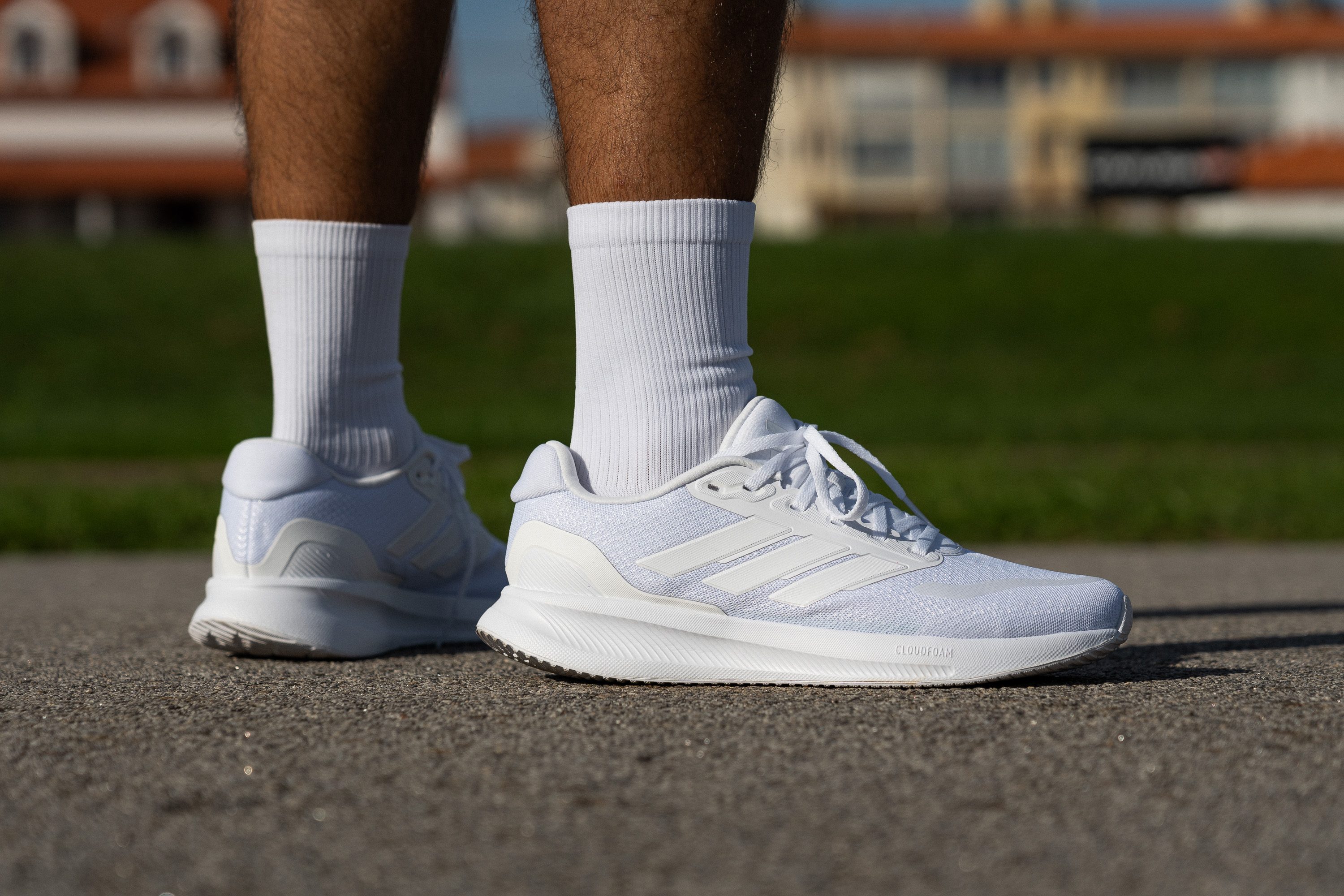
Who should NOT buy
We determined that the Runfalcon 5 struggles significantly with durability—the toebox, heel, and outsole all exhibited excessive wear. For runners concerned about this, we recommend considering the Brooks Revel 7—a similarly priced option with far superior longevity.
In our view, the Runfalcon 5 also falls short for those seeking a plush, cushioned ride. Its firm underfoot feel is unlikely to satisfy runners who prefer softer foams. Instead, we suggest exploring alternatives like the Nike Winflo 11 or Nike Interact Run, both of which provide a more cushioned experience with thicker, more forgiving midsoles.
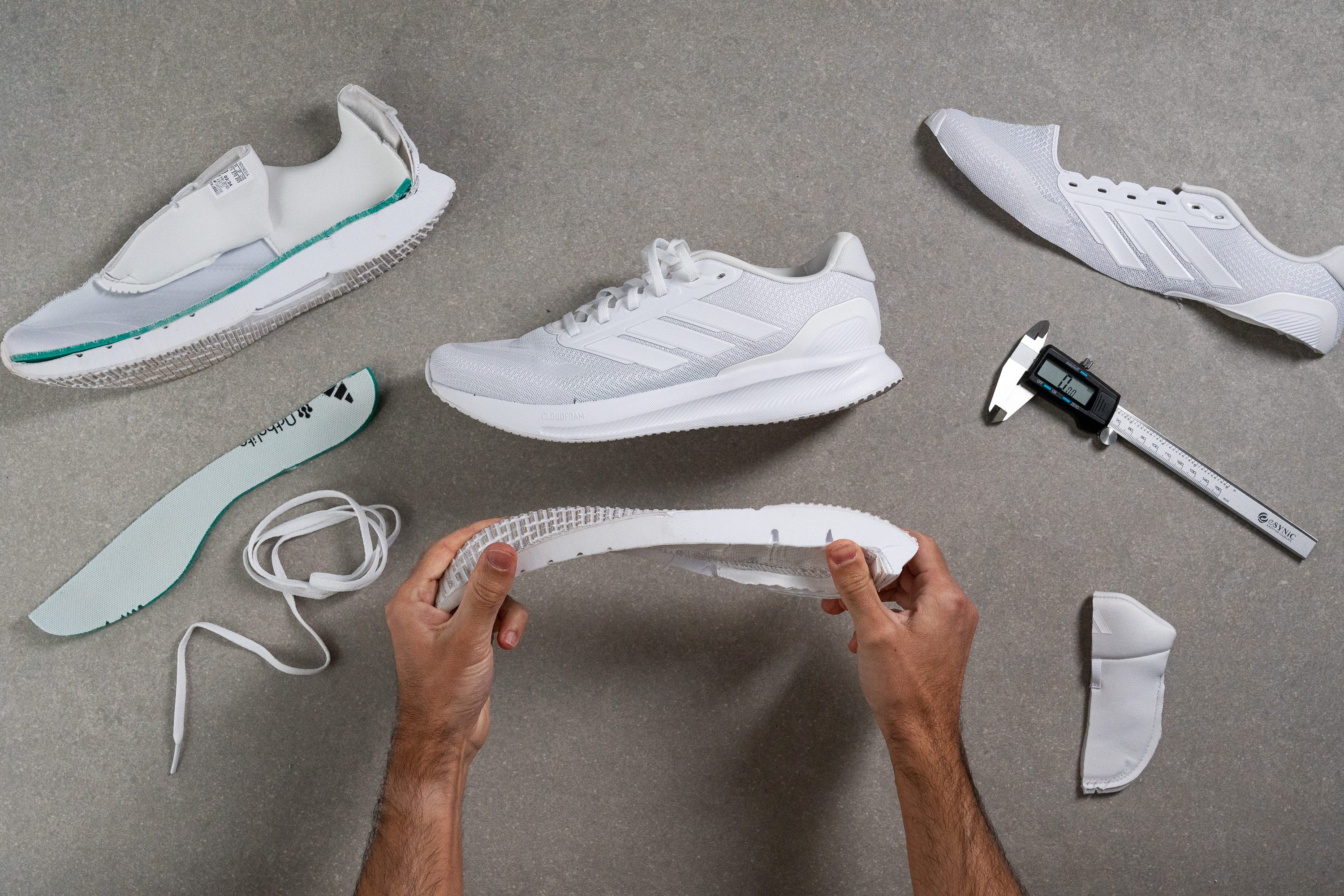
Cushioning
Shock absorption
The Runfalcon 5 blends design cues from both the SL and Ultraboost lines, creating an interesting hybrid. However, its shock absorption falls short compared to its siblings. We measured only 112 SA, noticeably lower than the 126 SA of the Ultraboost 5.
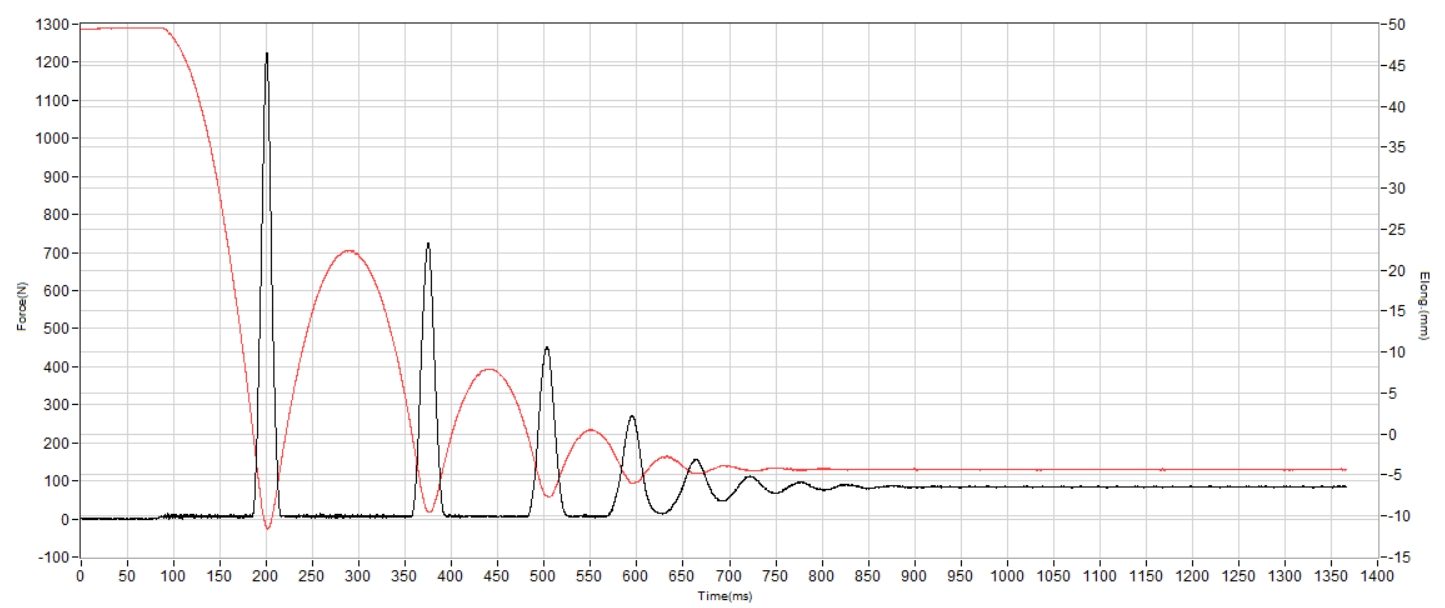
| Runfalcon 5 | 112 SA |
| Average | 130 SA |
Energy return
The Runfalcon 5 leans heavily on its cheap price tag to attract potential buyers, and that usually means energy return won’t be a standout feature. Our ASTM F1976 test confirmed it with a 52.2% score, clearly prioritizing affordability over performance.
| Runfalcon 5 | 52.2% |
| Average | 58.6% |
Heel stack
The heel stack exceeds the 30-mm threshold, which we consider the minimum for a well-cushioned shoe. Our calipers stopped at 31.2 mm—a balanced and reasonable height that works well for heel strikers.
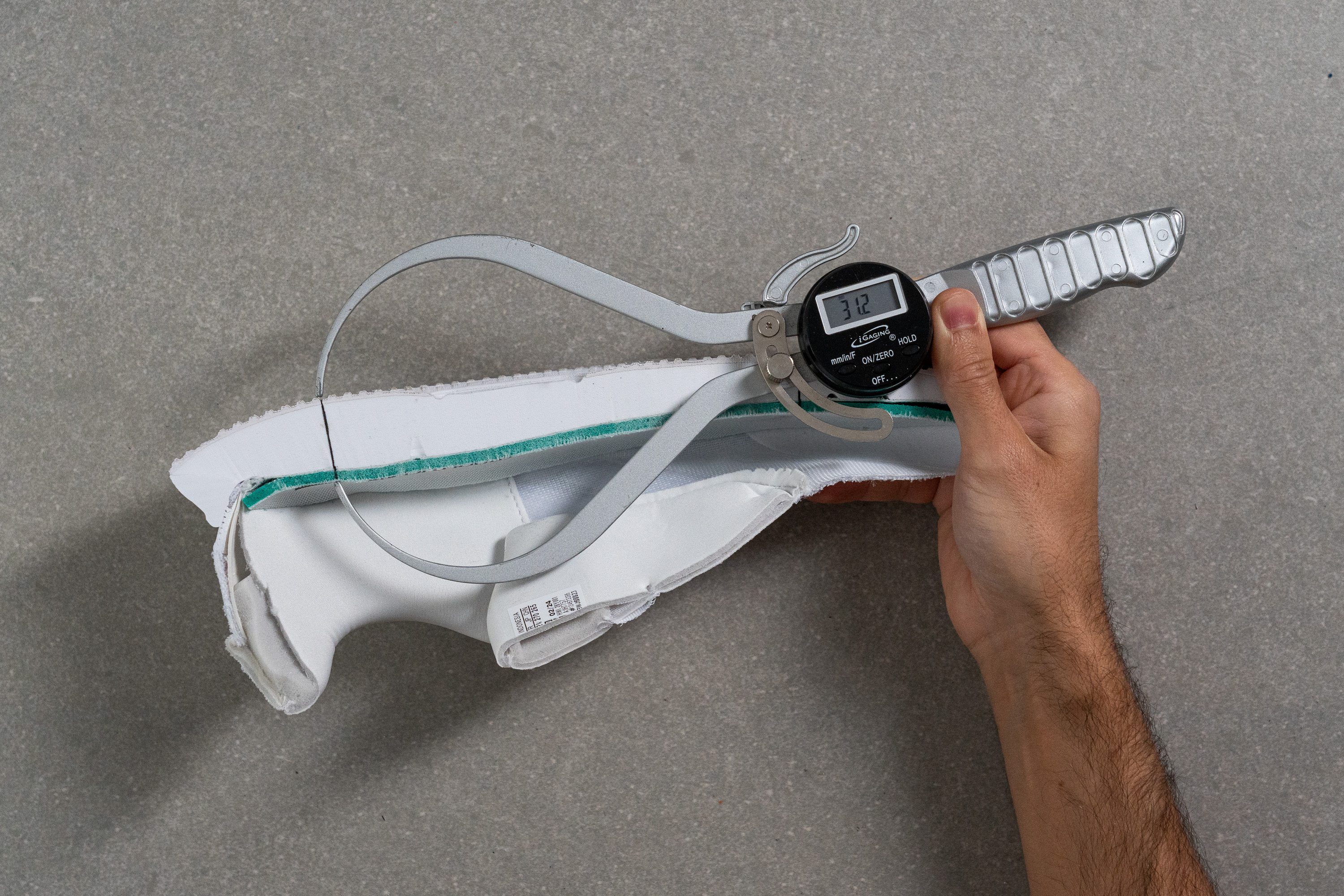
| Runfalcon 5 | 31.2 mm |
| Average | 34.8 mm |
Forefoot stack
One of the main issues with previous generations, like the Adidas Runfalcon 3, was the forefoot stack being smaller than expected.
Adidas addressed this problem by increasing the stack height, now measuring 21.8 mm—just shy of the stated 23 mm. In our experience, it’s a better fit even for runners who prefer a grounded feel where the connection to the road remains constant.
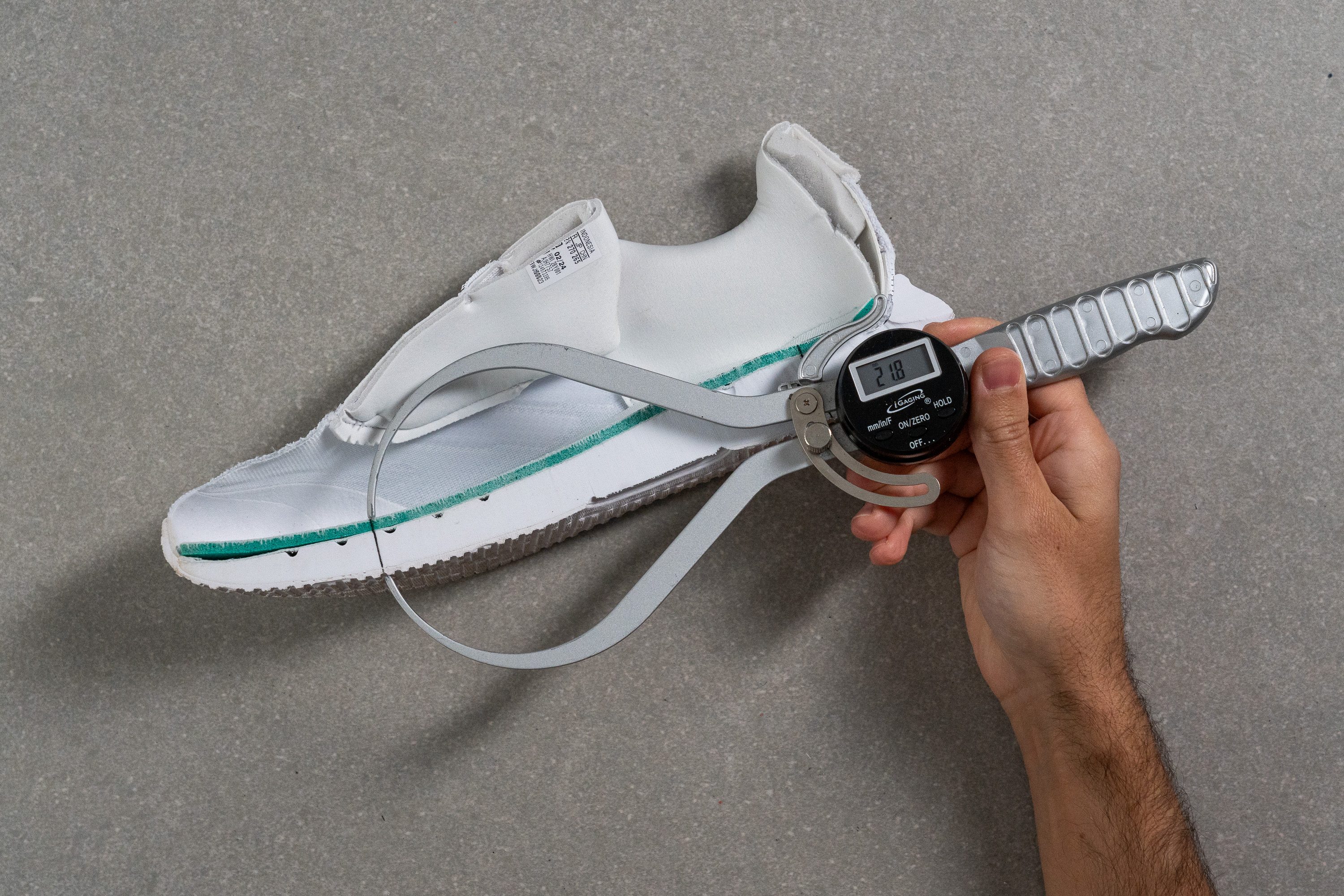
| Runfalcon 5 | 21.8 mm |
| Average | 26.2 mm |
Drop
We measured the drop—the height difference between the heel and forefoot—at 9.4 mm, which is very close to the stated 10 mm. This measurement aligns well with expectations for a budget-friendly running shoe designed for versatile use.
In our experience, the combination of stack height and drop subtly favors heel strikers, providing a smoother and more controlled transition from heel to toe.
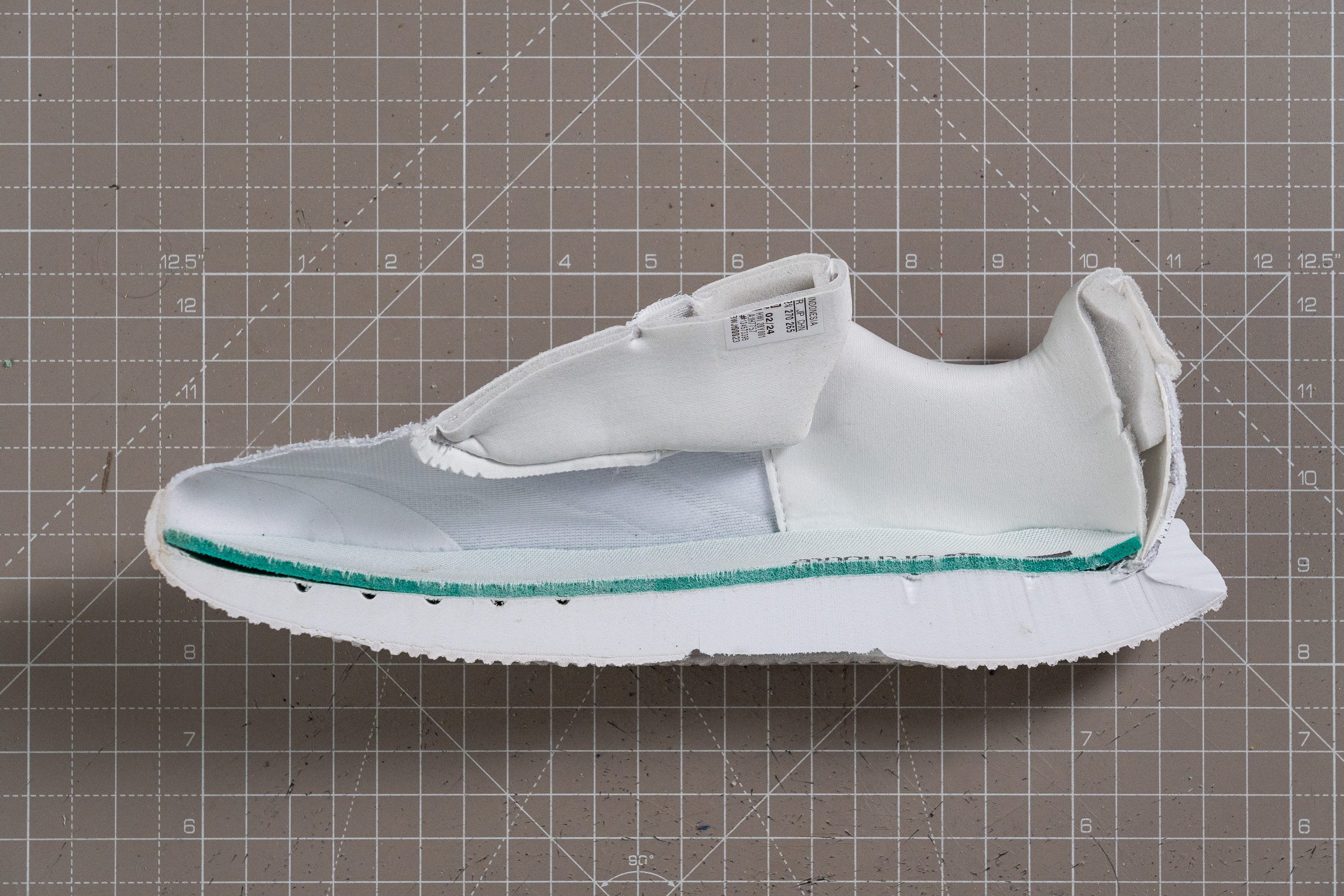
| Runfalcon 5 | 9.4 mm |
| Average | 8.6 mm |
Midsole softness
One of the defining features of the Runfalcon has always been its firm foam, which may not appeal to those seeking a plush ride. However, it's worth noting that with such a thin forefoot, we think a super-soft material simply wouldn’t work.
From our 26.1-HA reading, we can confidently say the Cloudfoam EVA—poor naming decision, Adidas—midsole in the Runfalcon 5 is best suited for runners who prefer a firm feel underfoot. For everyone else, it’s likely to feel uncomfortable. And naturally, don’t expect remarkable energy return—this is a budget-friendly option and the foam is typically the most expensive component of any running shoe.
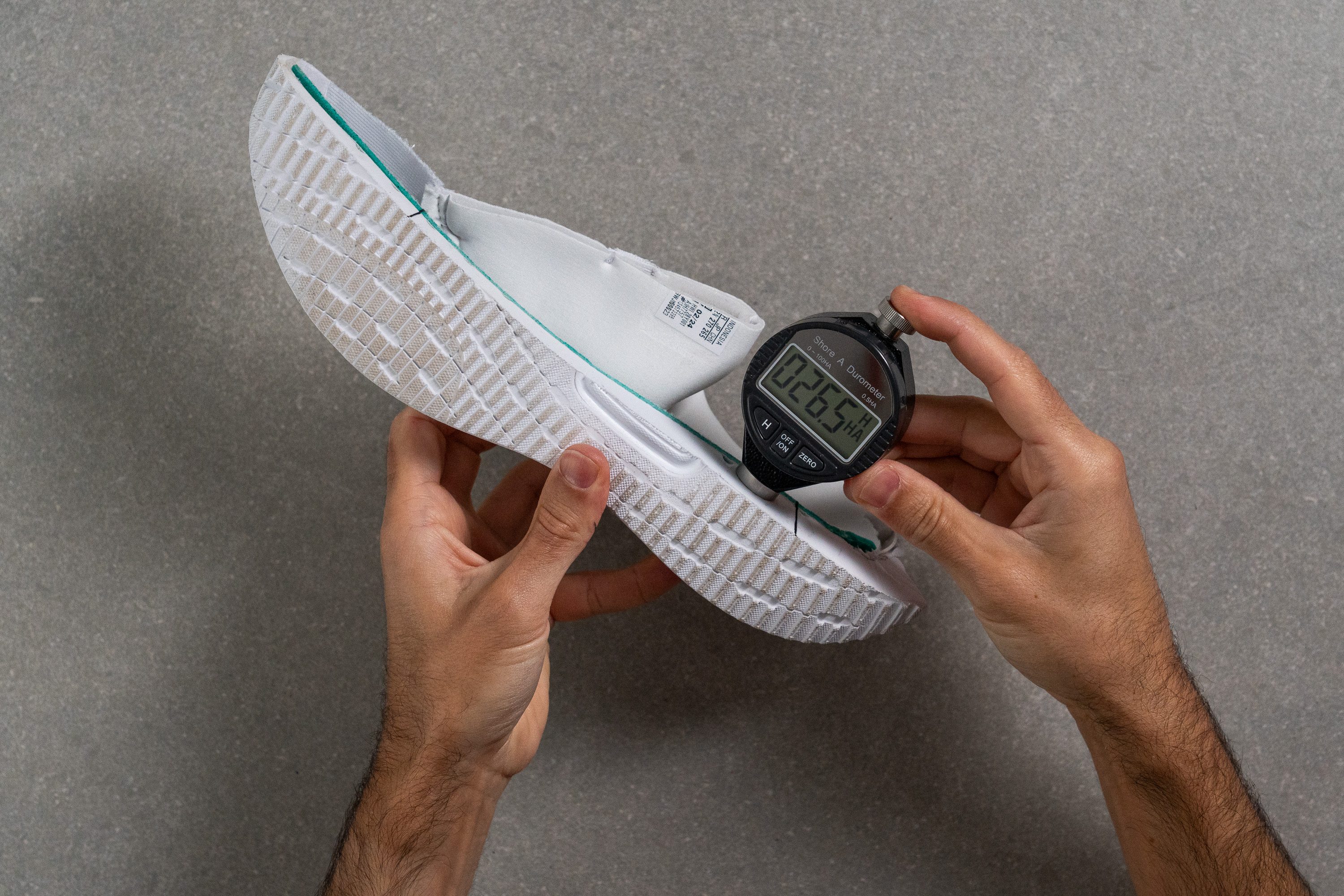
| Runfalcon 5 | 26.1 HA |
| Average | 20.4 HA |
Rocker
We discovered that the forefoot maintains a flat profile, making it one of the least rockered shoes we’ve tested recently in the lab. Nonetheless, its traditional design pairs well with the shoe’s high flexibility and modest stack height.
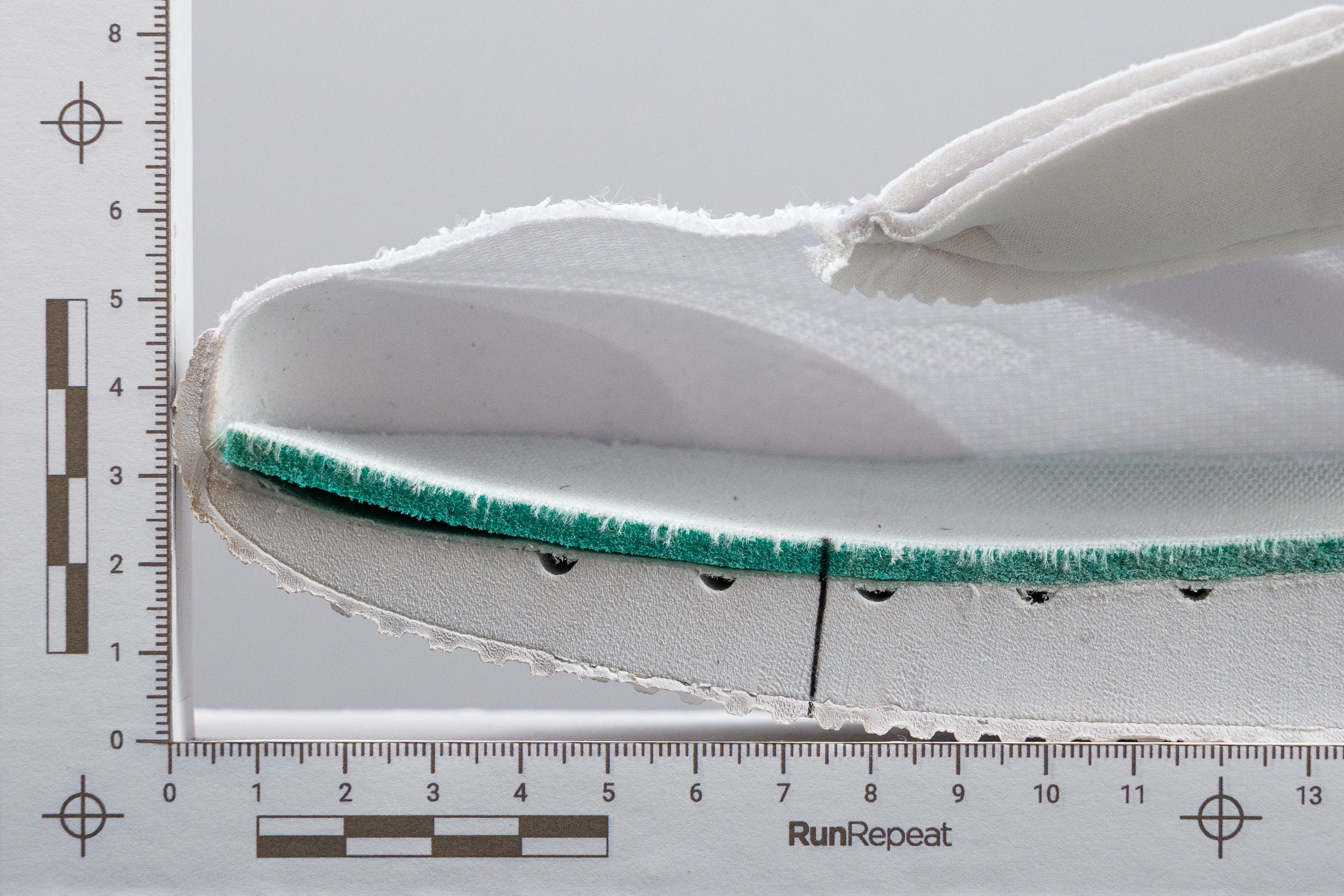
Size and fit
Size
Adidas Runfalcon 5 fits true to size (65 votes).
Internal length
| Runfalcon 5 | 272.0 mm |
| Average | 269.4 mm |
Width / Fit
When we created a gel cast of the Runfalcon’s interiors and let it solidify in the freezer, the result was a spacious 98.9 mm width.
That provides ample room for most foot shapes—perhaps even excessive for runners with slim feet.
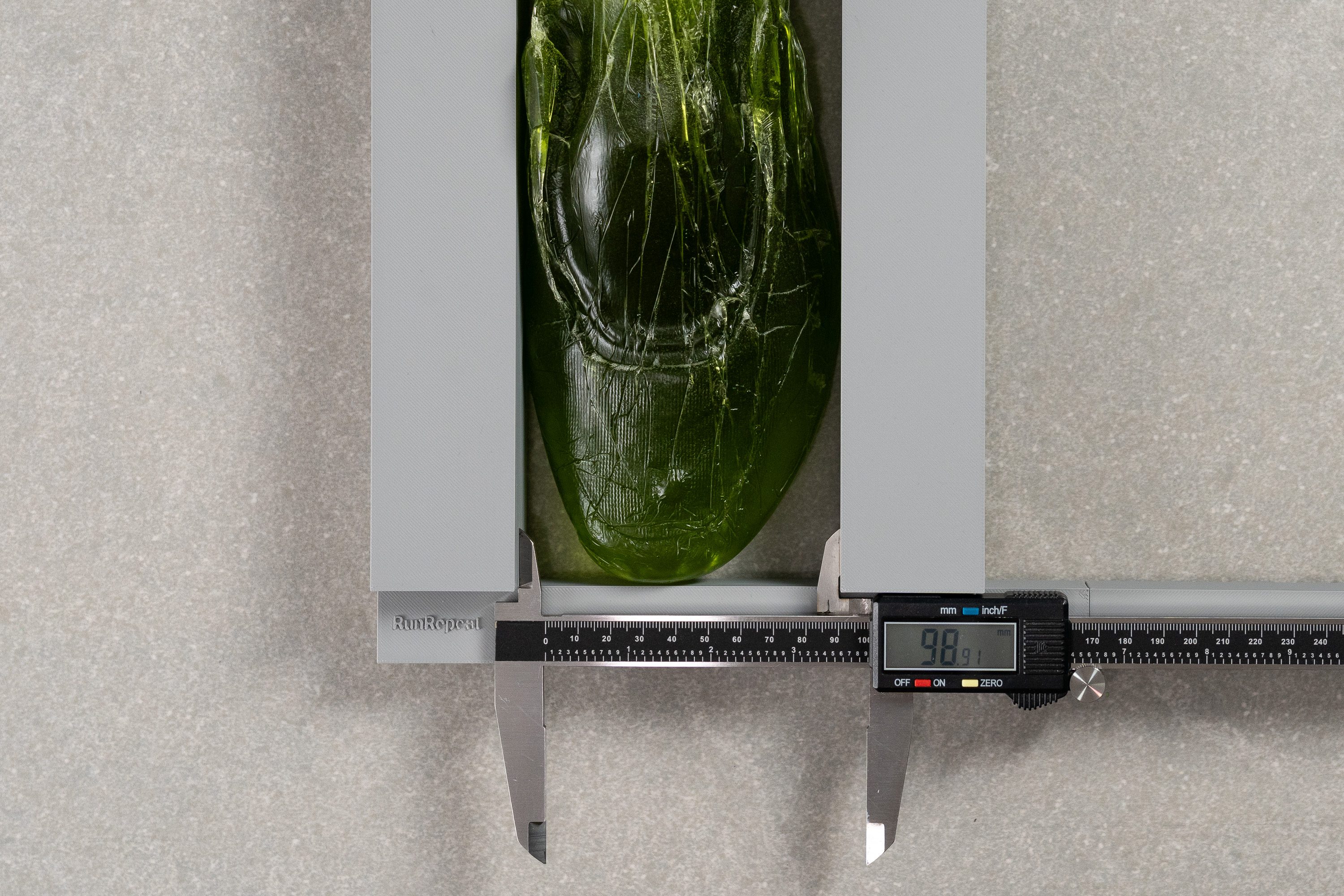
| Runfalcon 5 | 98.9 mm |
| Average | 95.1 mm |
Toebox width
We were initially concerned that the Runfalcon 5 might feature a super-tapered toebox, but it's not that bad. With 71.3 mm in the big toe area, it’s suitable for most individuals, though it works best for those with slim feet or those who prefer a snug fit.
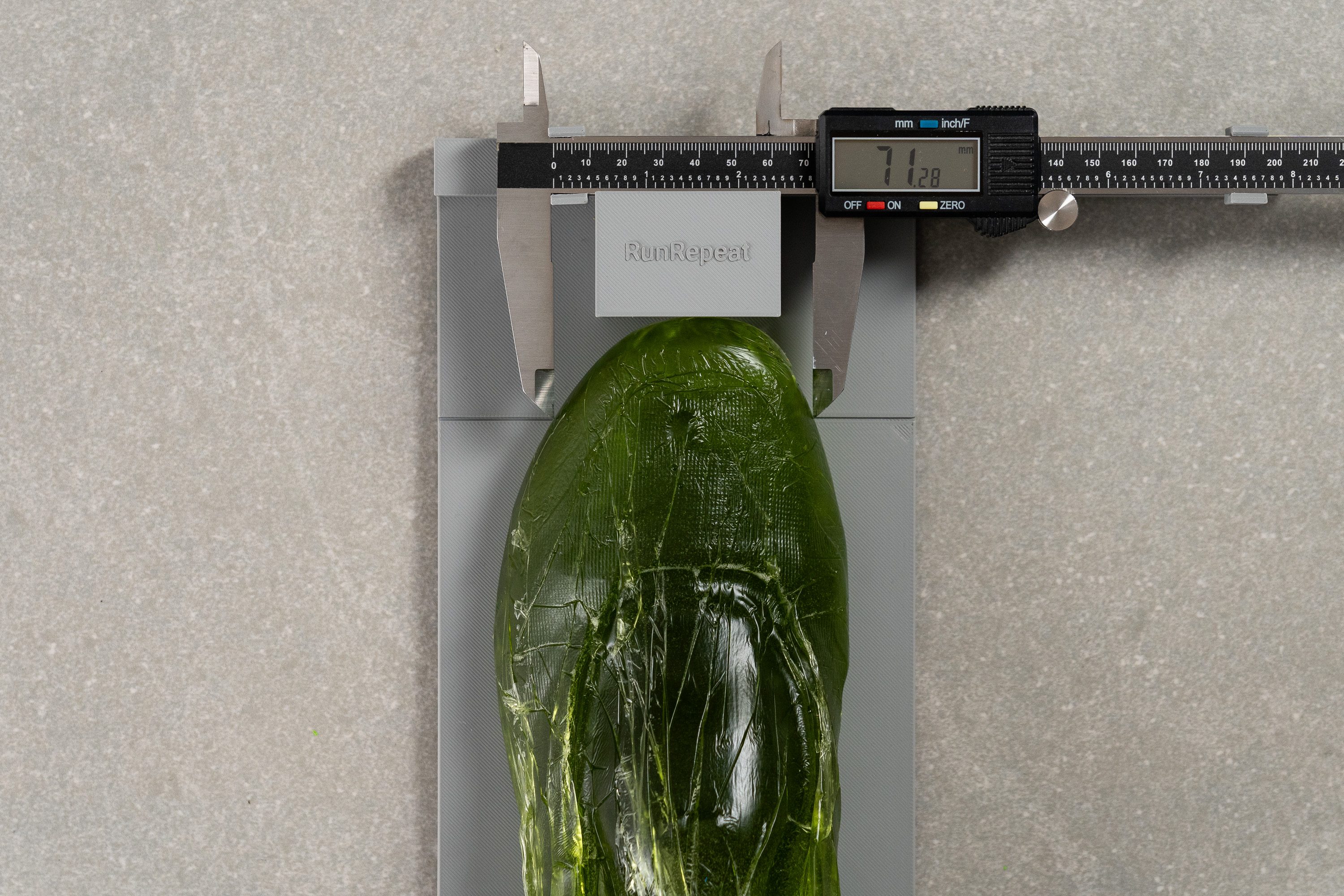
| Runfalcon 5 | 71.3 mm |
| Average | 73.3 mm |
Toebox height
In terms of vertical space, the measurement came in at 26.6 mm—a result that aligns perfectly with what’s expected from a daily trainer.
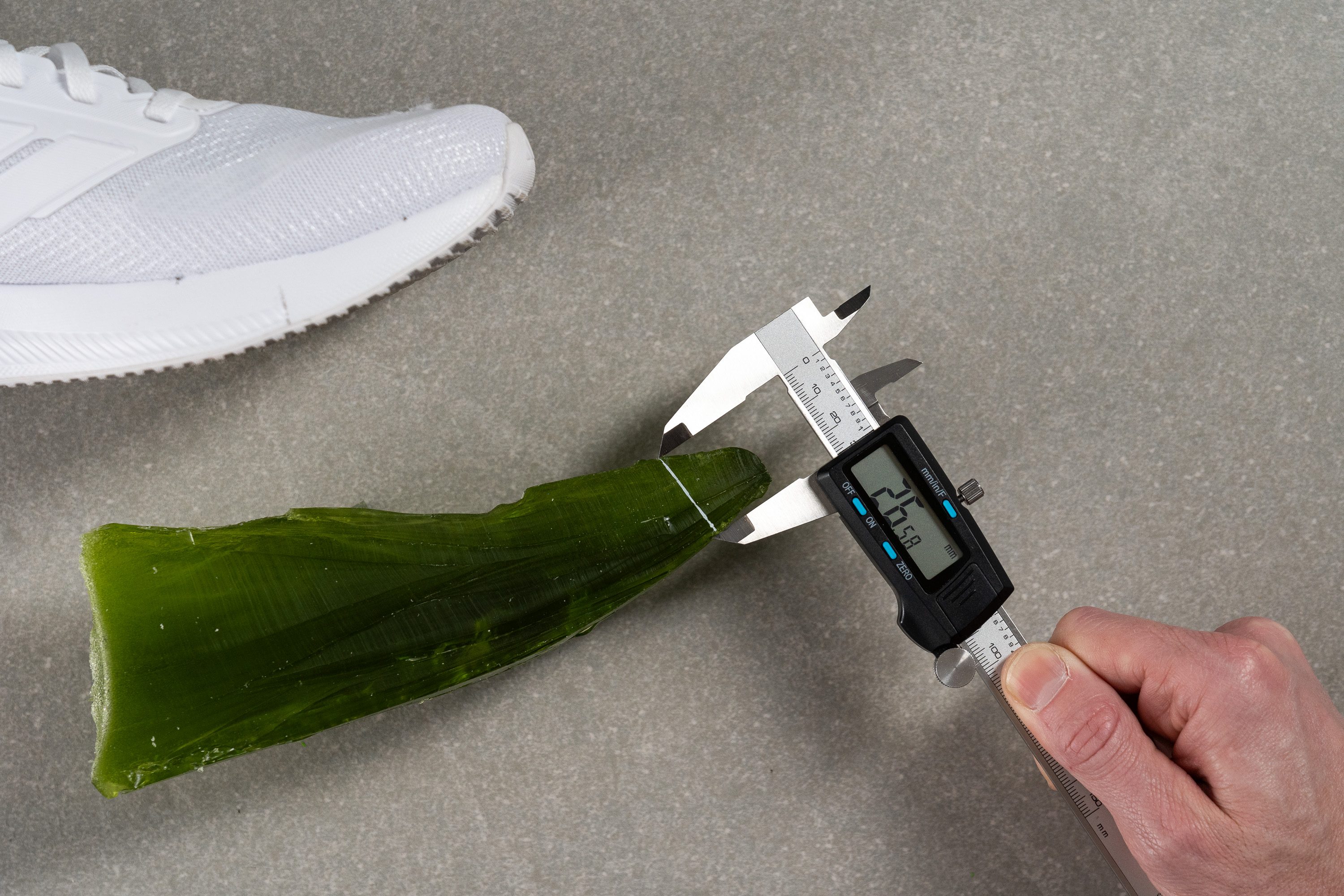
| Runfalcon 5 | 26.6 mm |
| Average | 27.0 mm |
Traction / Grip
Traction test
The Adidas Runfalcon 5 steps out of our machine as one of the worst performers we've ever tested in the SATRA TM144 traction test.
Scoring just 0.12, it delivered a shockingly weak grip that will let you down even on dry pavement. We found it really underwhelming for runners, and only recommend it for slow-paced, mostly walking use if grip isn't a priority.
| Runfalcon 5 | 0.12 |
| Average | 0.49 |
Outsole design
The outsole provides full-length coverage, a welcome feature for those who often experience uneven wear in unexpected areas or spots where midsoles are typically left exposed. In our experience, that’s not an issue with the Runfalcon 5.
We also found that Adidas used denser rubber in high-wear zones, such as the medial heel and lateral forefoot.
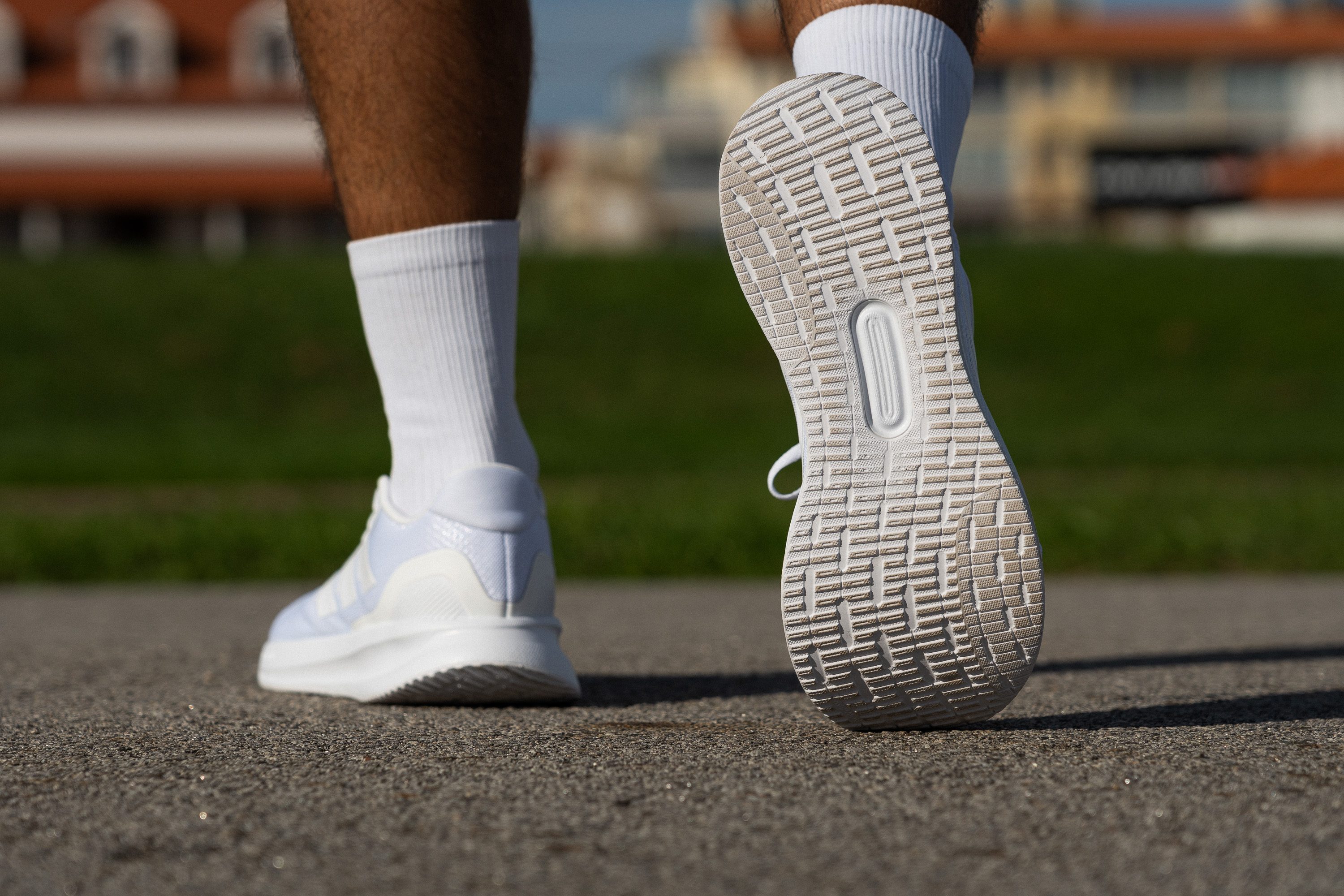
Flexibility / Stiffness
We found the Runfalcon 5 to be mildly-flexible. During our 30-degree bend test, we only needed 12.0N—making it ideal for casual, all-day wear. That’s fortunate, because its grip is too disappointing for serious runs.
| Runfalcon 5 | 12.0N |
| Average | 15.3N |
Weight
Adidas continues to refine the weight of the Runfalcon, successfully keeping it under the 10 oz mark. Here in the lab, the Runfalcon 5 weighed in at 9.7 oz or 275g. Pretty good!
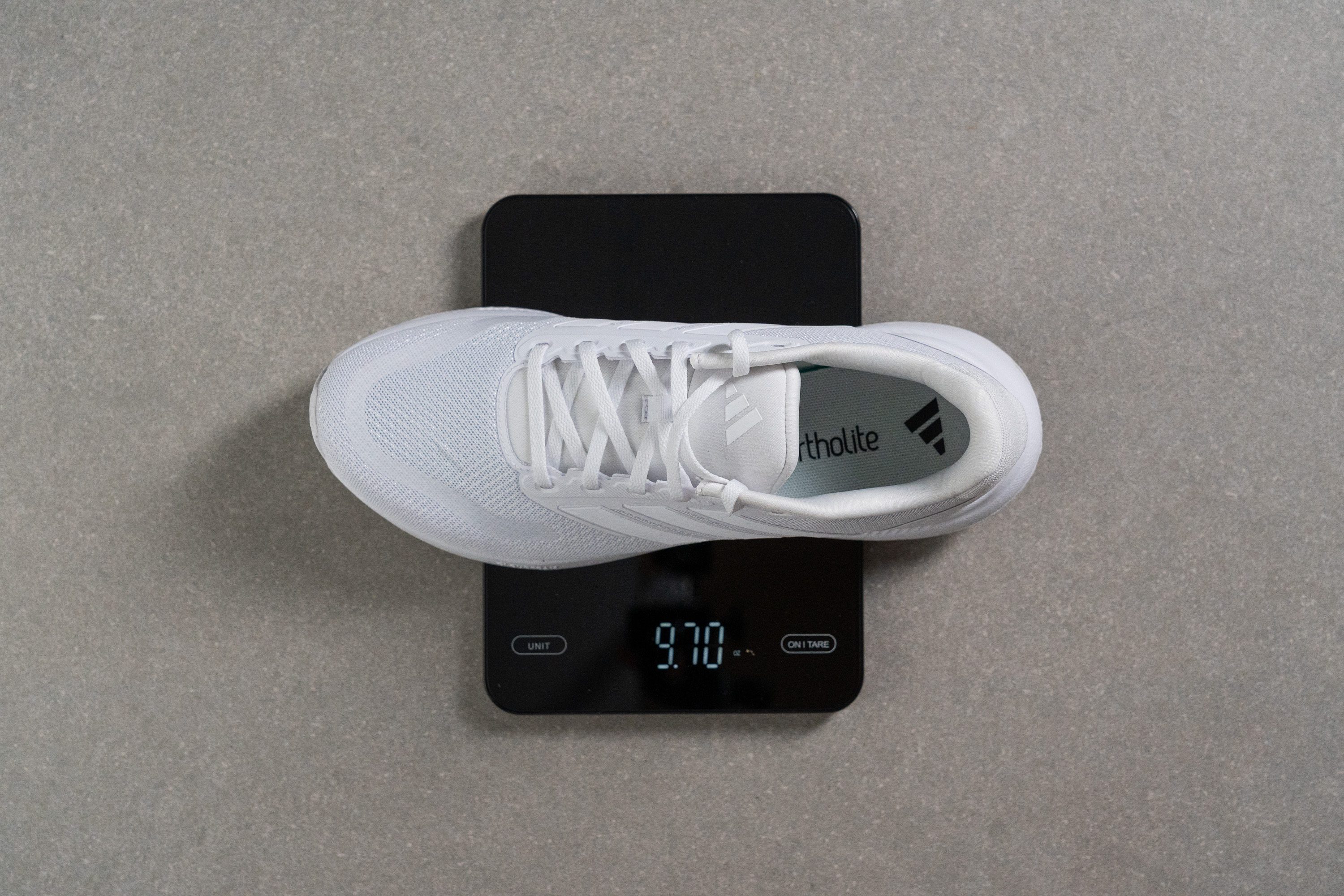
| Runfalcon 5 | 9.7 oz (275g) |
| Average | 9.3 oz (264g) |
Breathability
While the Runfalcon 5 offers some ventilation, we found it to be noticeably limited compared to most road running shoes. This led us to award it a 3/5 for breathability—a result that makes it better suited for cooler climates than hot summer runs.
In our experience, this was a bit disappointing, as we had hoped for improvements in ventilation compared to previous models. Earlier versions, like the Runfalcon 3, faced similar challenges, and we think this remains less than ideal for those tackling high temperatures.
Curious about the cause of restricted airflow, we examined the upper under a microscope.
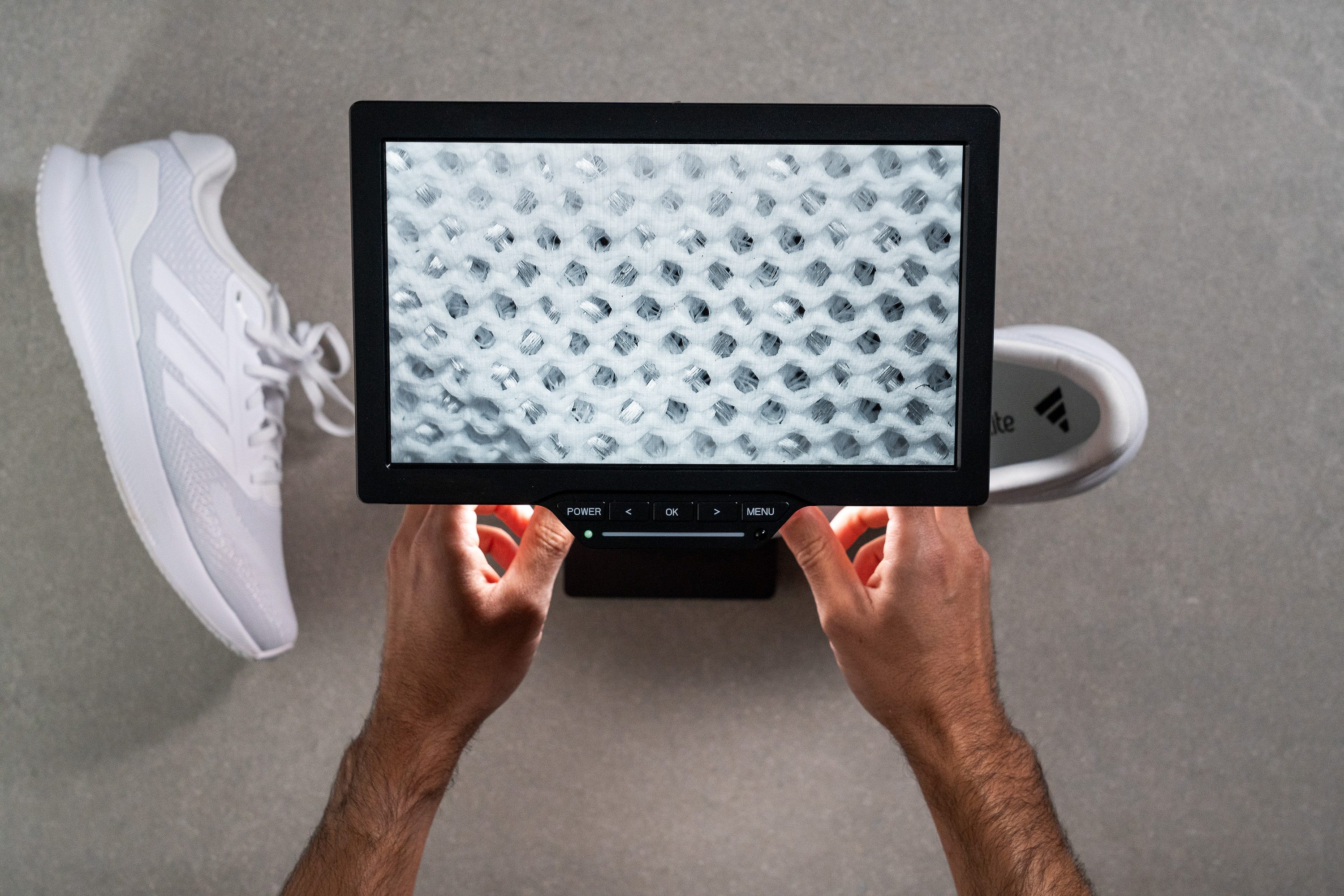
We discovered that while the engineered mesh includes some gaps, the dual-layered design traps most of the air, reducing breathability. However, there are no big ventilation holes at all.
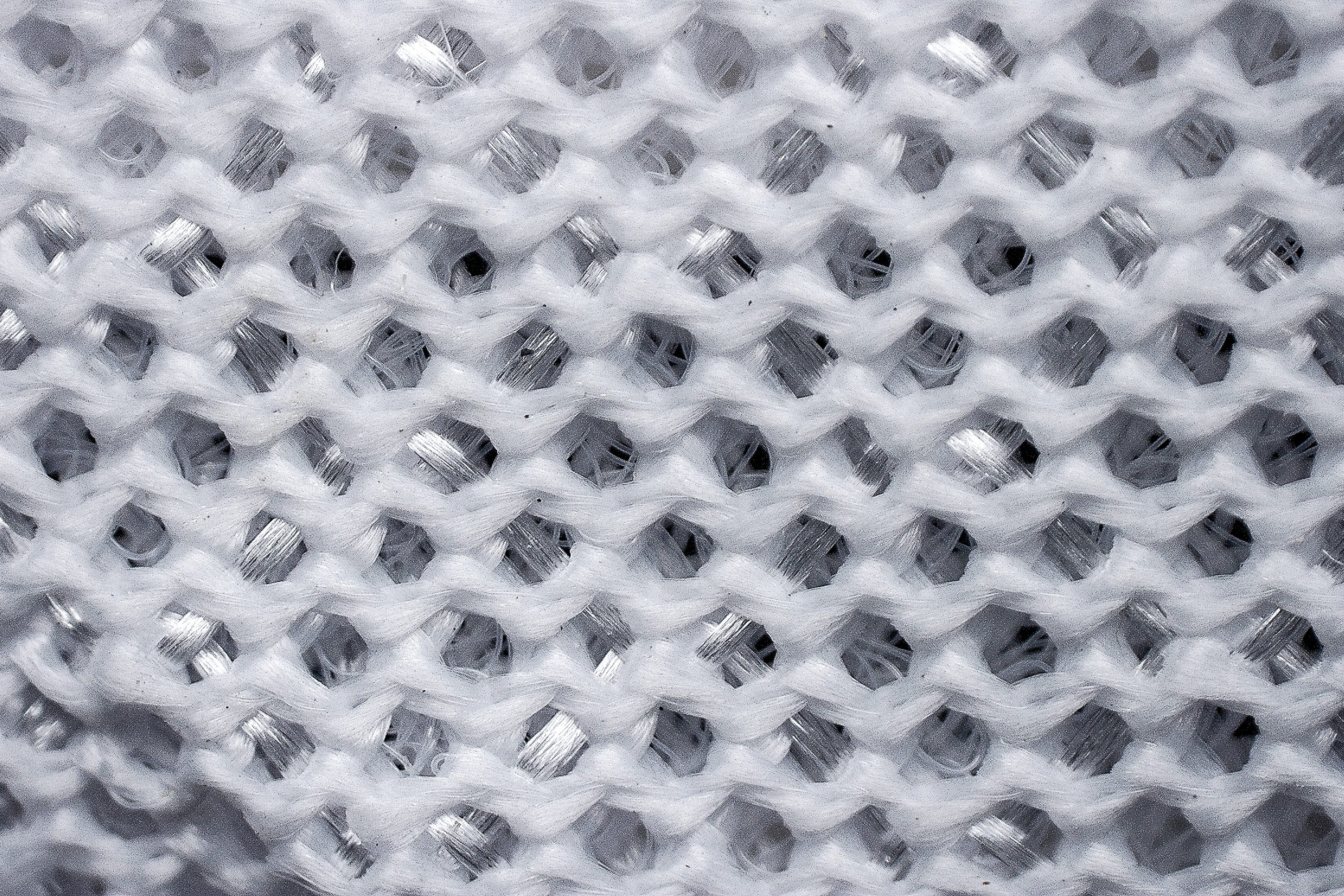
That said, we need to put this into context. This is a budget-friendly shoe, and for the price, the upper delivers adequate comfort and decent ventilation.
Still, we believe it could benefit from improved airflow for added usability in warmer conditions.
| Runfalcon 5 | 3 |
| Average | 3.7 |
Stability
Lateral stability test
The Adidas Runfalcon 5 is a neutral running shoe that incorporates some stability-focused elements. Most notably, it features an Ultraboost-inspired heel counter with dual plastic pieces cradling the heel to keep it securely centered.
Torsional rigidity
We found the Runfalcon 5 to be highly flexible, making it a great choice for jogging. While this compromises some stability, we believe this trade-off works well for a shoe often used for walking.
| Runfalcon 5 | 2 |
| Average | 3.5 |
Heel counter stiffness
The Ultraboost-inspired heel counter is notably rigid, but its support is limited to the sides of the heel. In contrast, we found some flexibility at the top, leading us to assign a 3/5 score.
| Runfalcon 5 | 3 |
| Average | 2.9 |
Midsole width - forefoot
Another key reason this shoe is best suited for neutral runners lies in its midsole dimensions. Our calipers measured 109.8 mm, revealing a streamlined silhouette that doesn’t accommodate those with pronation or supination issues.
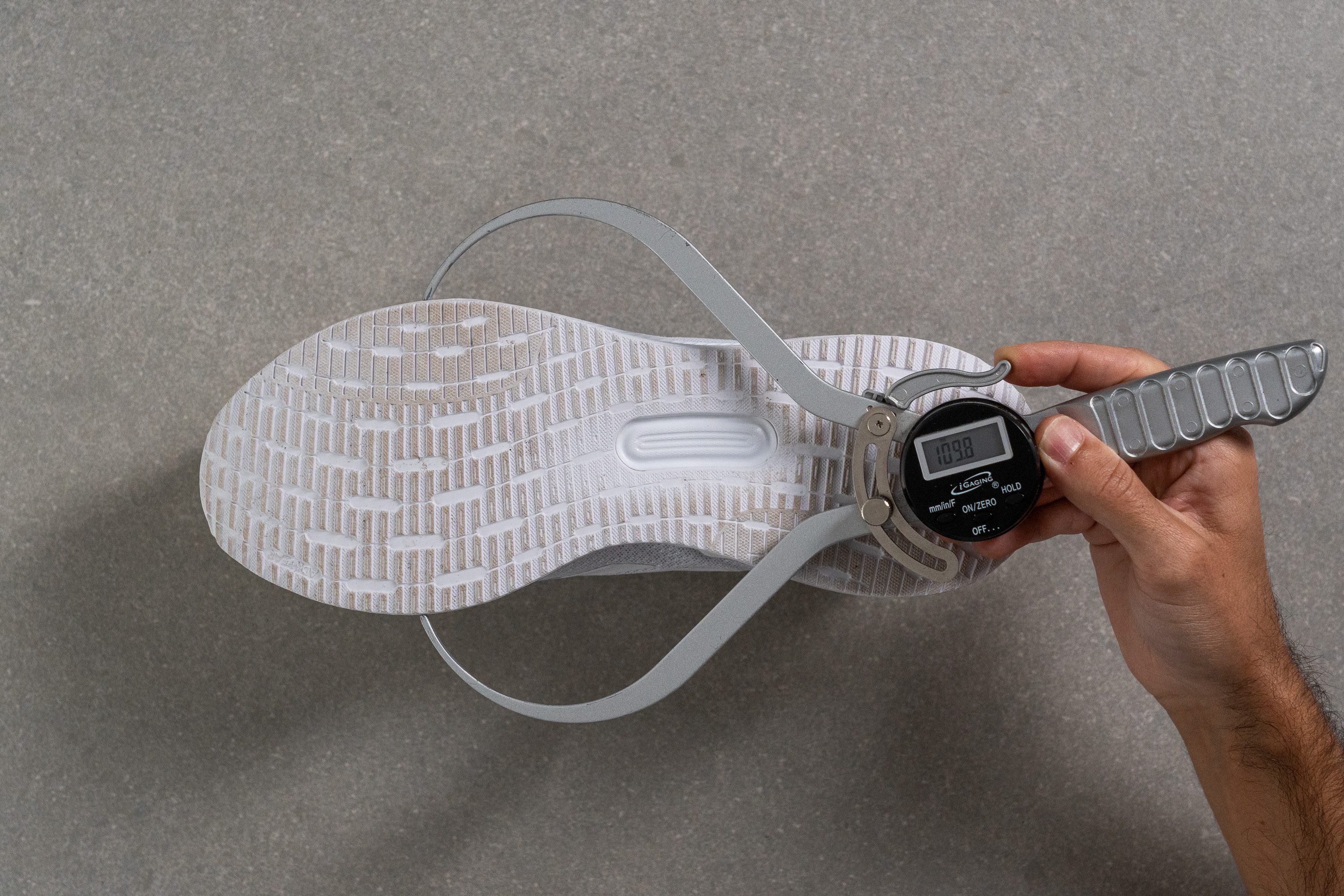
| Runfalcon 5 | 109.8 mm |
| Average | 114.4 mm |
Midsole width - heel
The heel is wider, measuring 91.7 mm, to better accommodate heel strikers. In our view, this design makes sense for a beginner-friendly, budget-conscious running shoe like the Runfalcon 5, as its primary users are likely those who land on their heels.
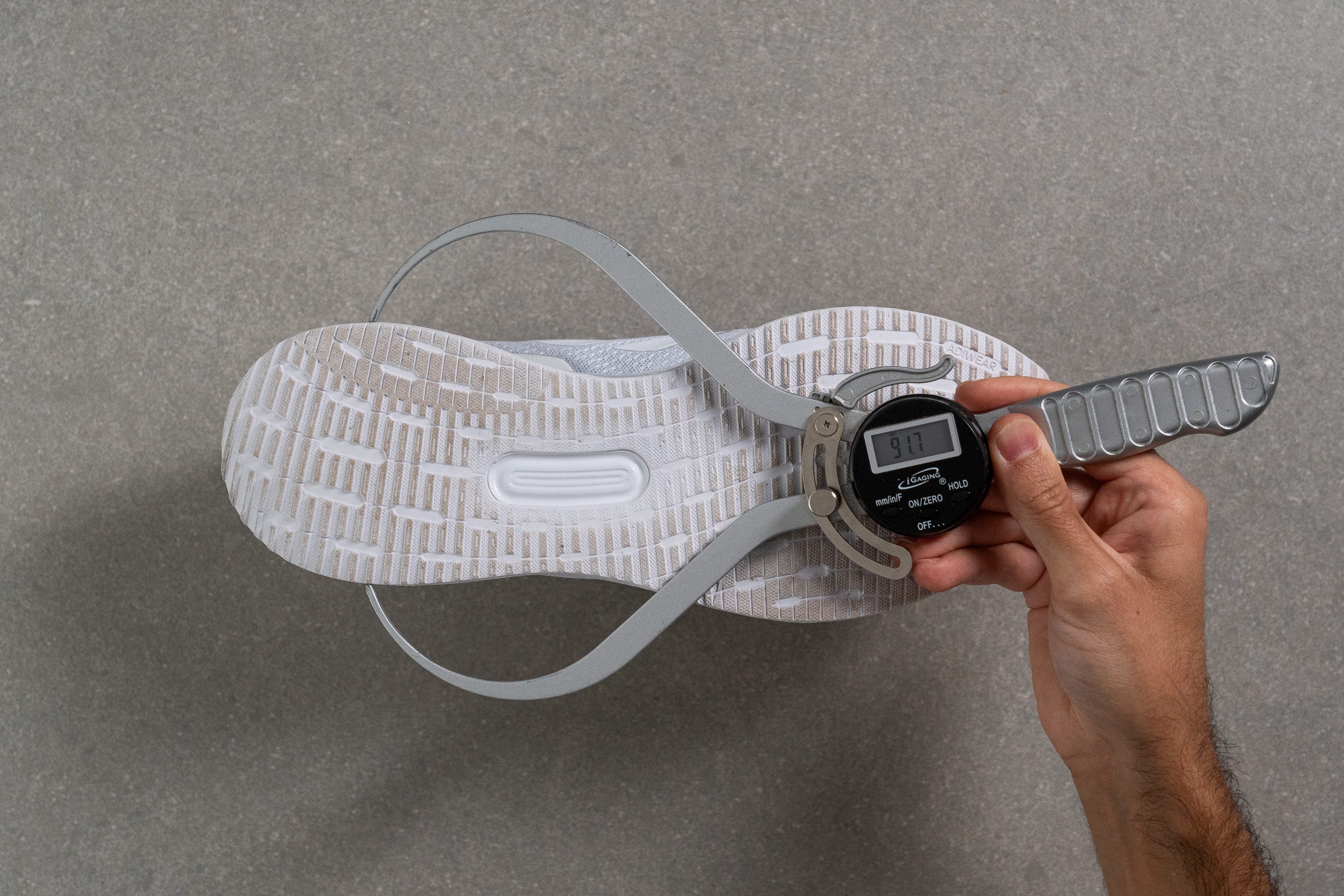
| Runfalcon 5 | 91.7 mm |
| Average | 90.6 mm |
Durability
Toebox durability
We anticipated a strong result in this test, as shoes with intermediate ventilation often prove tougher against our Dremel. However, we found the opposite—an underwhelming 1/5 score that leaves no room for doubt.
| Runfalcon 5 | 1 |
| Average | 2.6 |
Heel padding durability
The upper features generous padding in the heel, enhancing comfort—a detail we appreciated. However, in our testing, we found that this padding became a problem when paired with a weak lining that struggled to resist damage.
After testing, we discovered that the Runfalcon 5 performed poorly, earning a disappointing 1/5. In our view, this result is particularly concerning for those putting on and removing the shoe multiple times a day.
| Runfalcon 5 | 1 |
| Average | 3.4 |
Outsole durability
While less-than-stellar grip is something we expect from a budget-friendly running shoe, durability is an entirely different matter—it's reasonable to have higher expectations in this area.
After testing with our Dremel, as we do for every shoe, we measured a disappointing 1.5 mm of damage—significantly more than the average. In our view, this result raises real concerns for long-term wear.
| Runfalcon 5 | 1.5 mm |
| Average | 1.1 mm |
Outsole thickness
At 2.7 mm, the outsole thickness is about what we expected, though a bit more might have helped, especially given the poor durability we observed in our Dremel test.
For those that expect a long-lasting outsole, the Runfalcon 5 may fall a bit short.
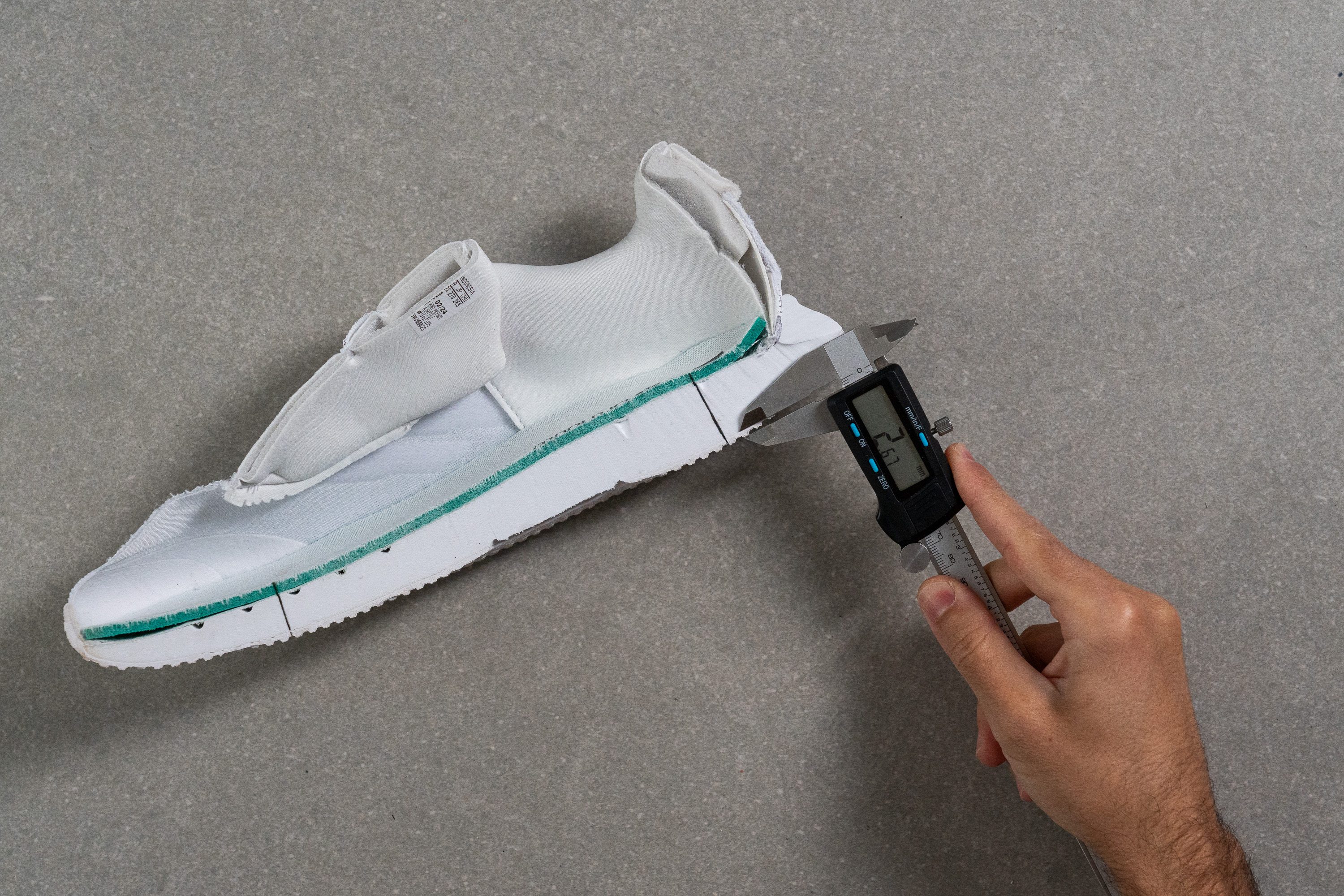
| Runfalcon 5 | 2.7 mm |
| Average | 3.2 mm |
Misc
Insole thickness
The insole is fairly standard, with a thickness of 4.0 mm.
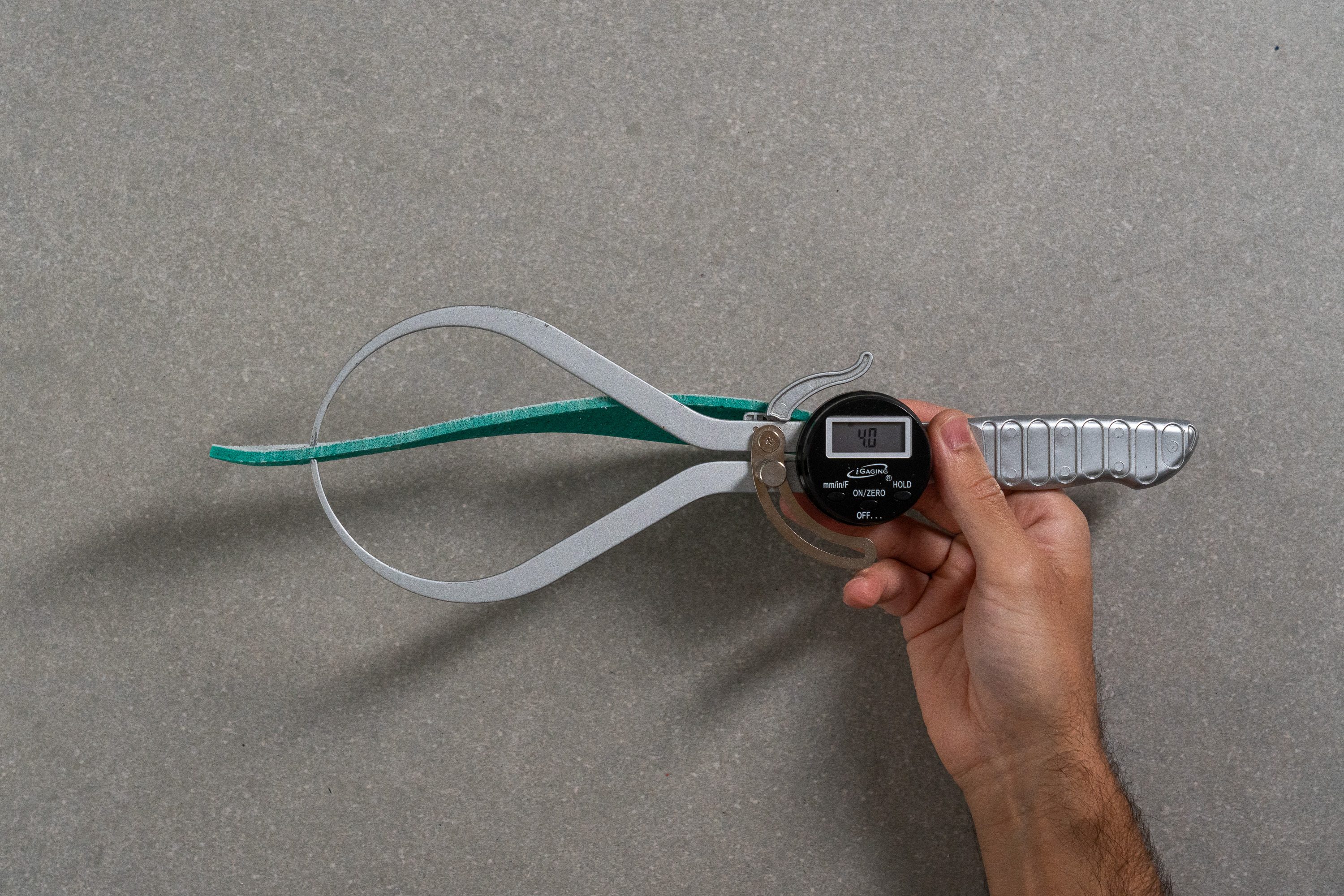
| Runfalcon 5 | 4.0 mm |
| Average | 4.5 mm |
Removable insole
The insole included with the Runfalcon 5 is made by Ortholite, a pleasant surprise for a cost-effective running shoe. And it’s removable, allowing you to easily swap it out if needed.
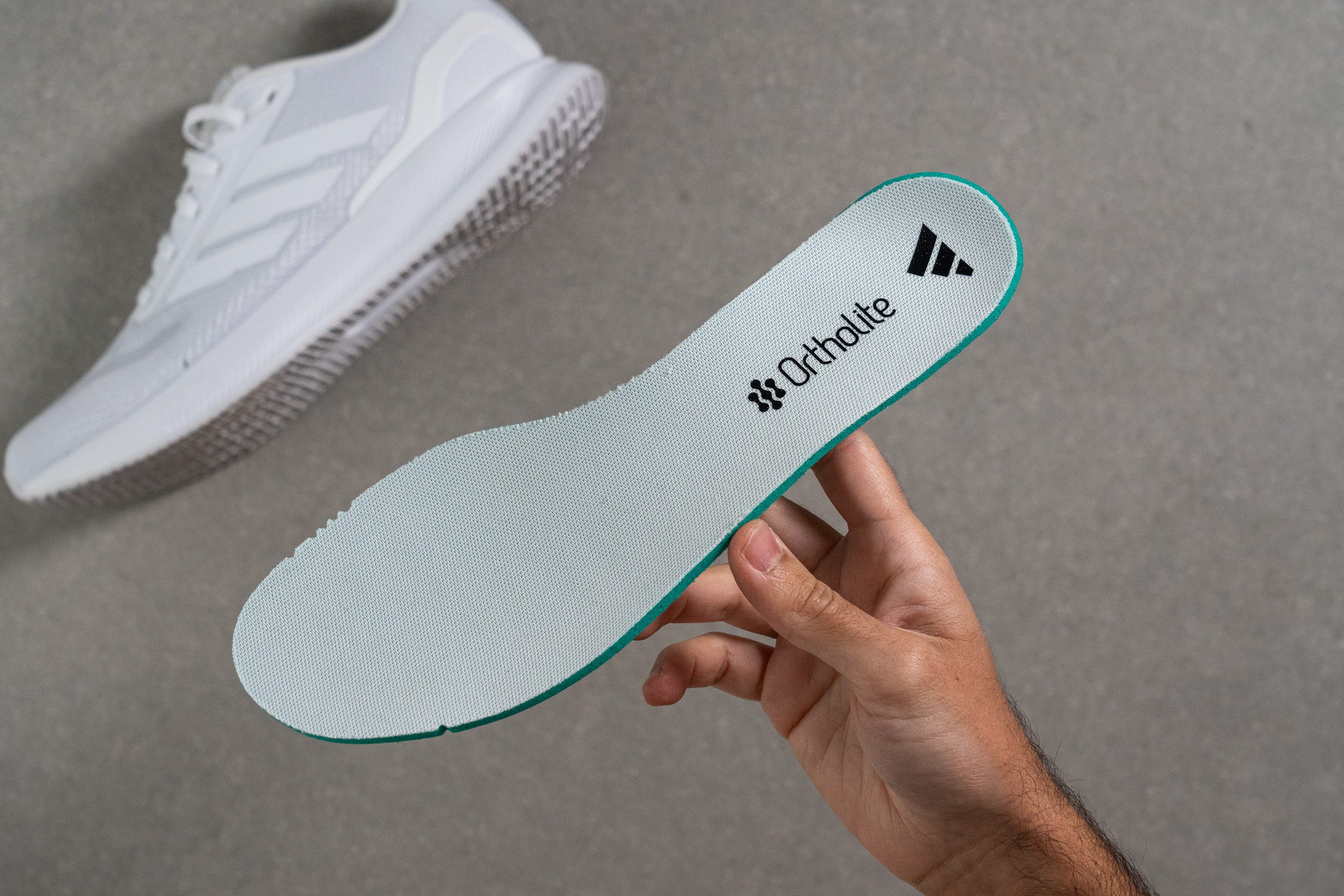
| Runfalcon 5 | Yes |
Midsole softness in cold (%)
After placing the Runfalcon 5 in the freezer for 20 minutes, we found its softness decreased by only 16.9%—an impressive result for an EVA foam. That's quite a surprise!
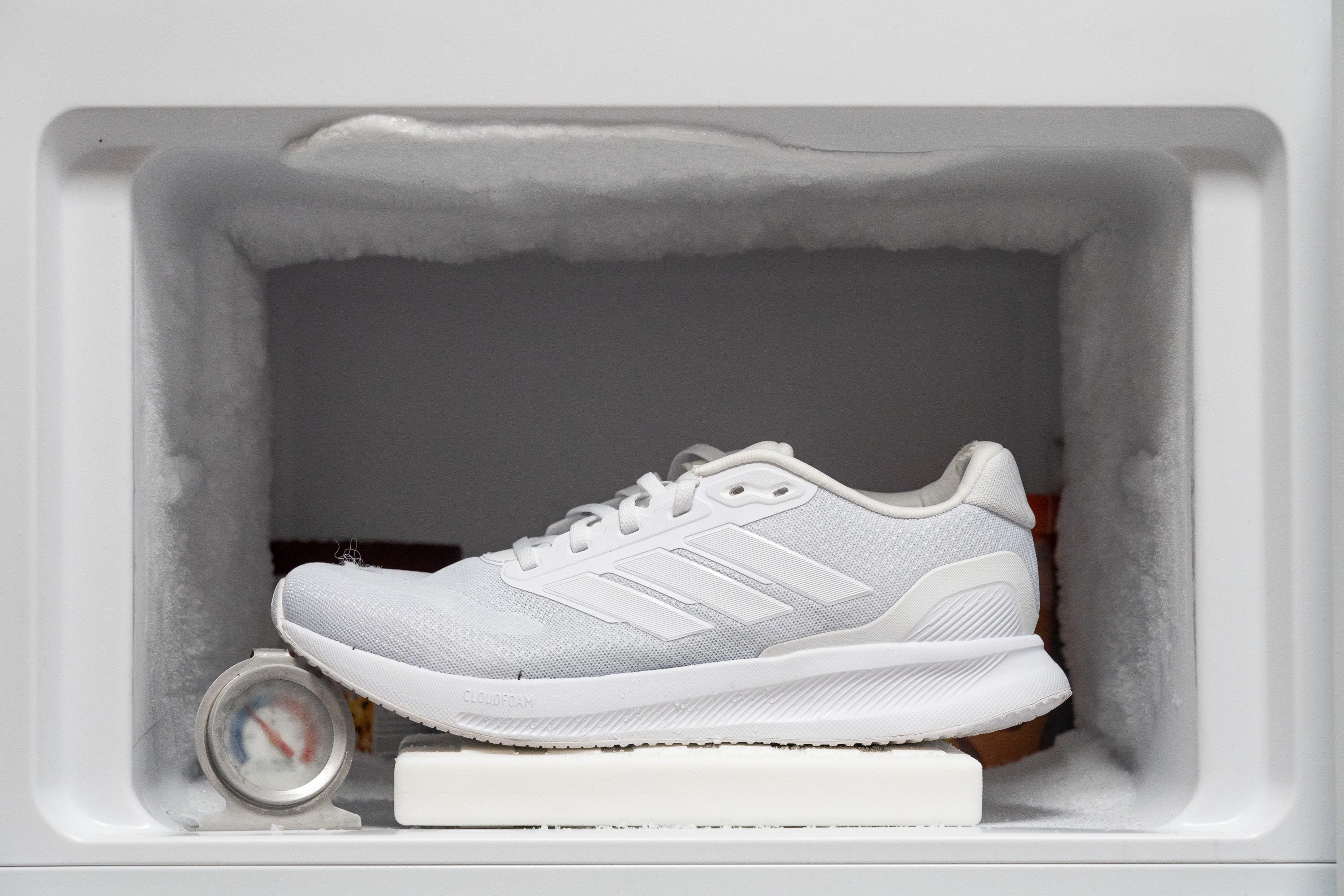
| Runfalcon 5 | 17% |
| Average | 24% |
Reflective elements
Priced aggressively, we didn’t expect any premium features—though they’re always a welcome addition. That's why, in our view, the absence of reflective elements on the Runfalcon 5 is understandable.
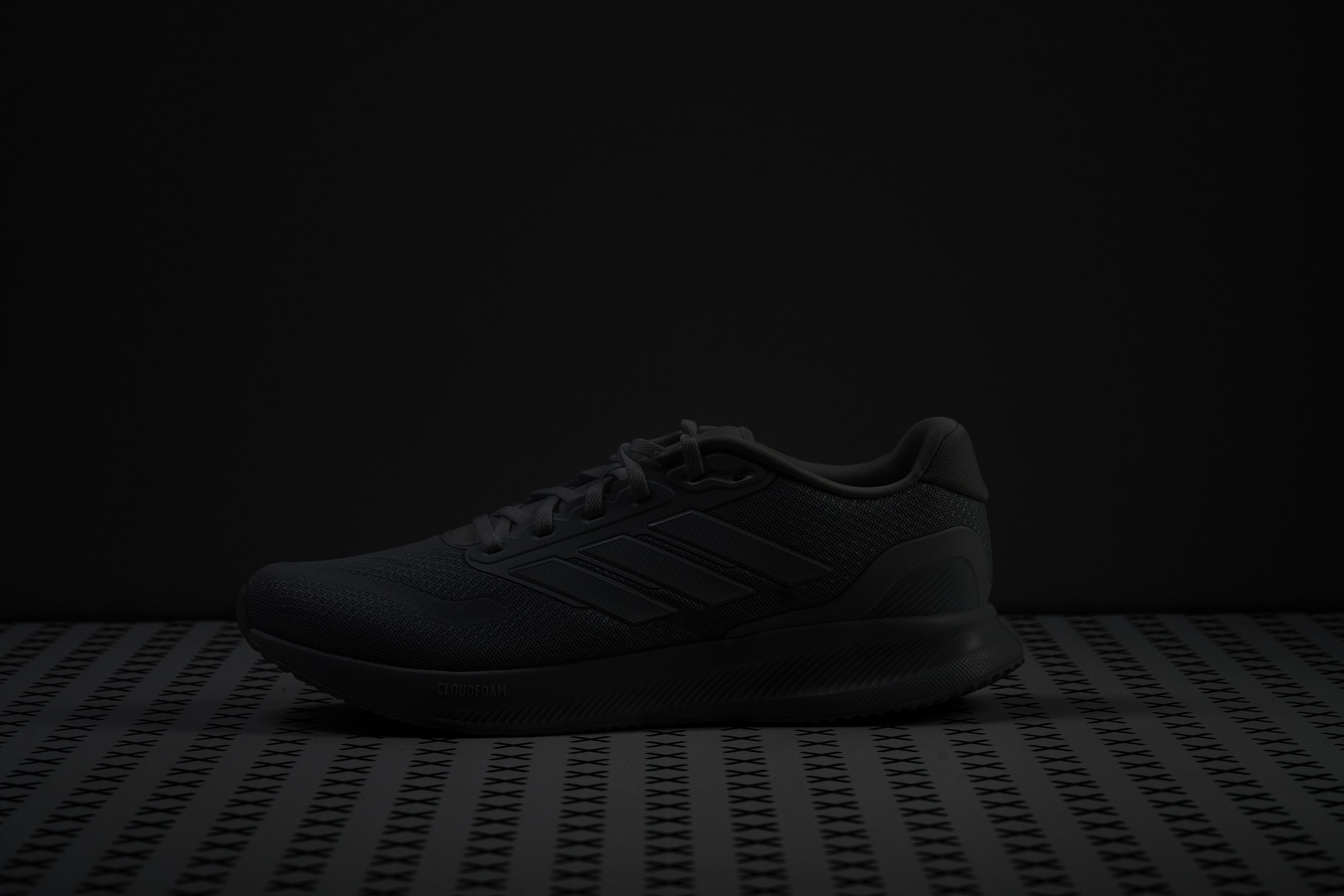
| Runfalcon 5 | No |
Tongue padding
The tongue boasts an impressive three layers of foam, resulting in a hefty 9.7 mm of padding that feels almost excessive. Honestly, we would have preferred less cushioning here and more in the shoe's forefoot!
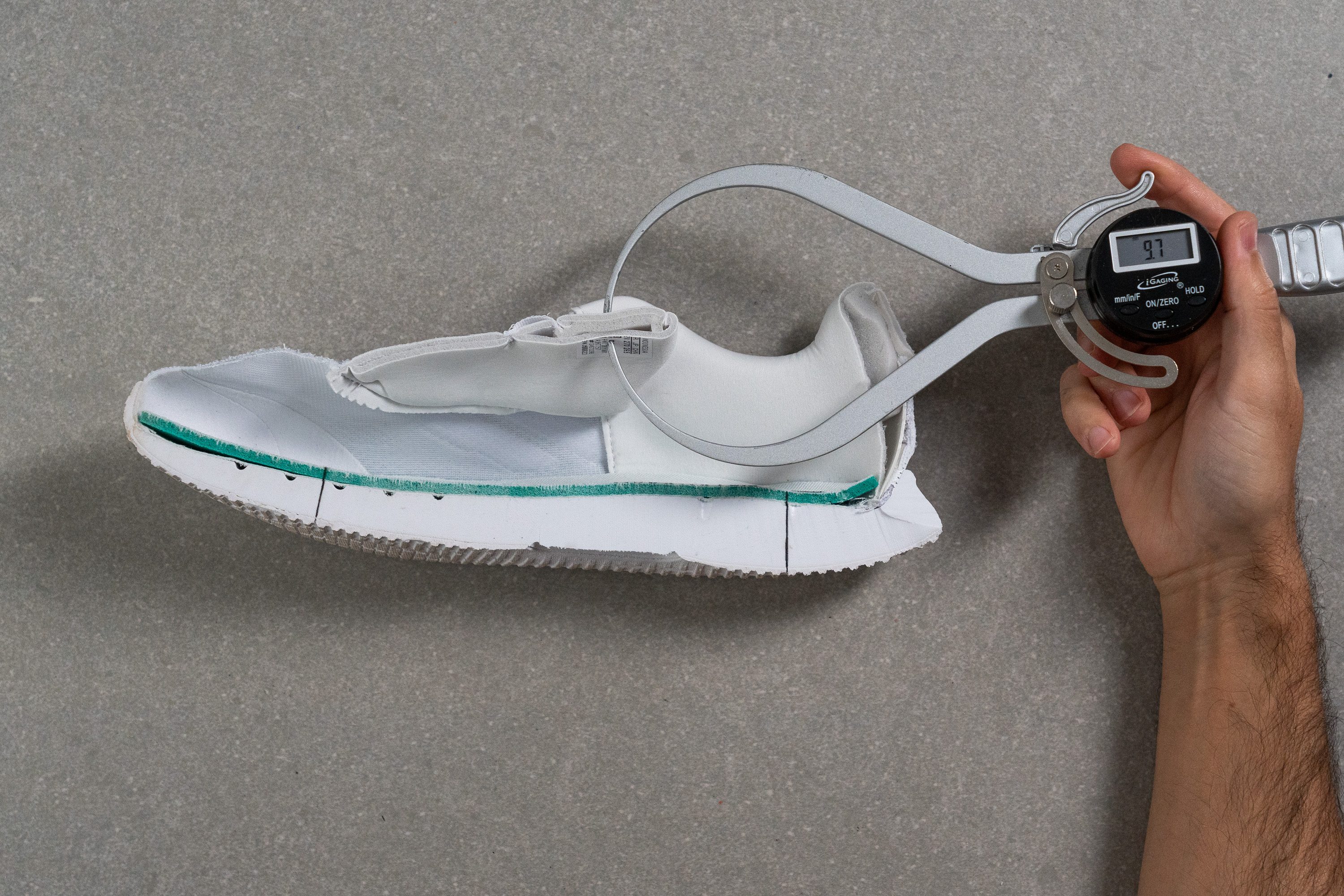
| Runfalcon 5 | 9.7 mm |
| Average | 5.7 mm |
Tongue: gusset type
The tongue isn’t attached to the sides, though we didn’t expect it to be for its low price. However, it features a tongue loop that helps slightly in keeping it centered during runs.
In fact, given the generous padding we found before, we think tightening the laces firmly is a smart way to prevent some lateral movement of the tongue.

| Runfalcon 5 | None |
Price
The Runfalcon 5 retains the same price as previous versions, keeping it among the most budget-friendly options on the market—nearly unbeatable in value. And hey, seeing this steady pricing amid industry-wide increases was a nice surprise.
| Runfalcon 5 | $65 |
| Average | $153 |
Heel tab
Even adding a heel tab increases production costs, which explains why Adidas might skip it in a budget-friendly running shoe like this one!
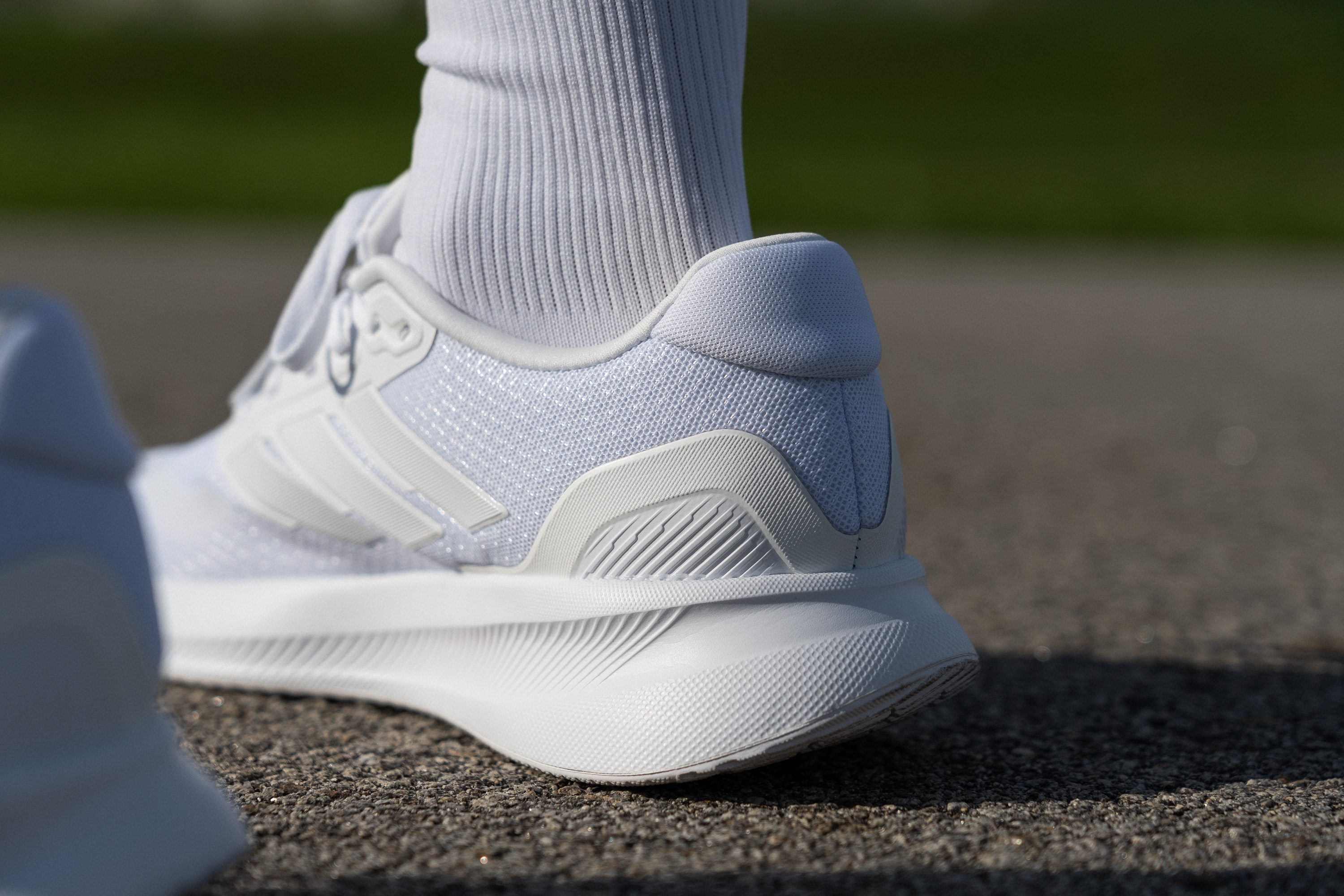
| Runfalcon 5 | None |

